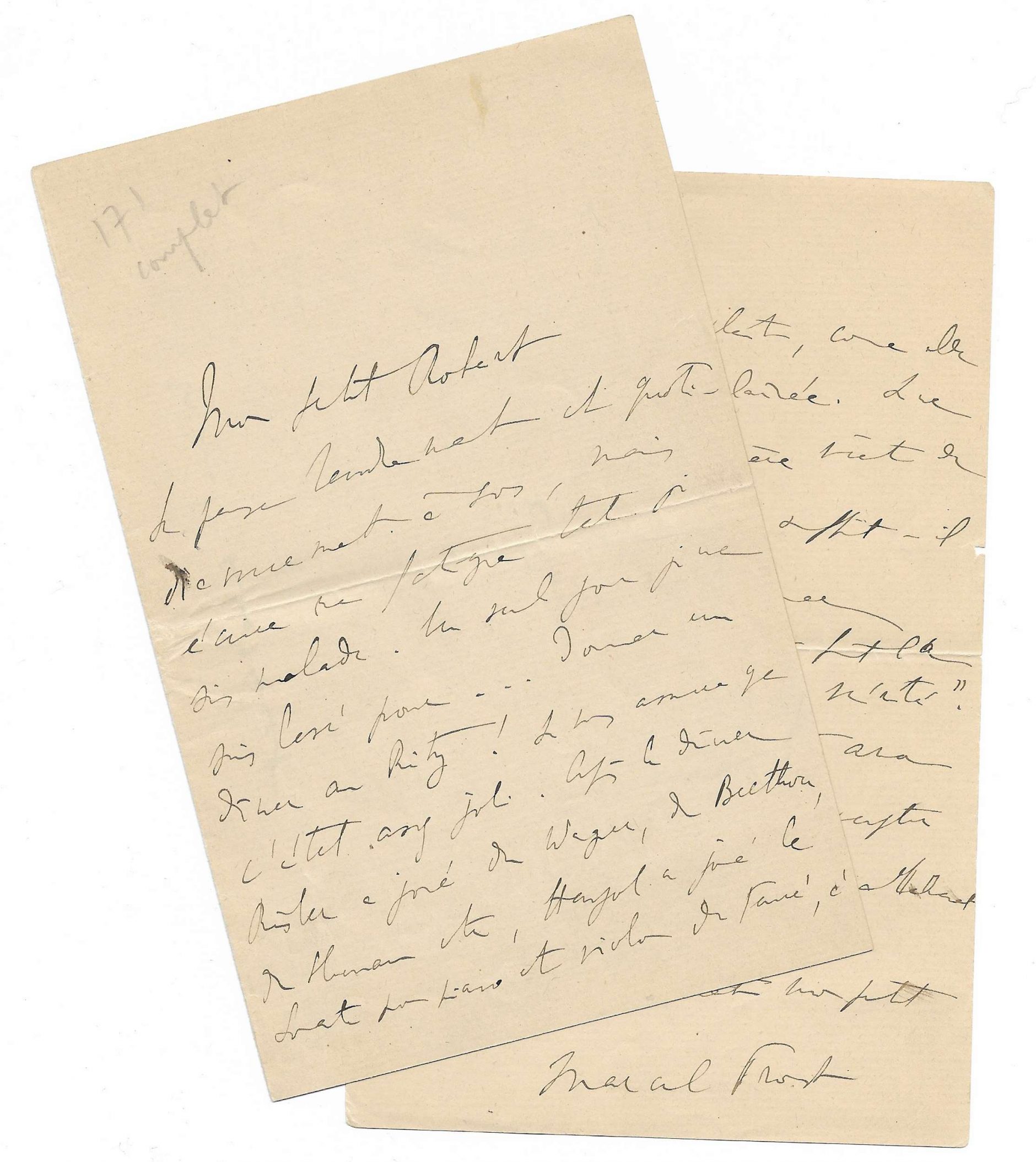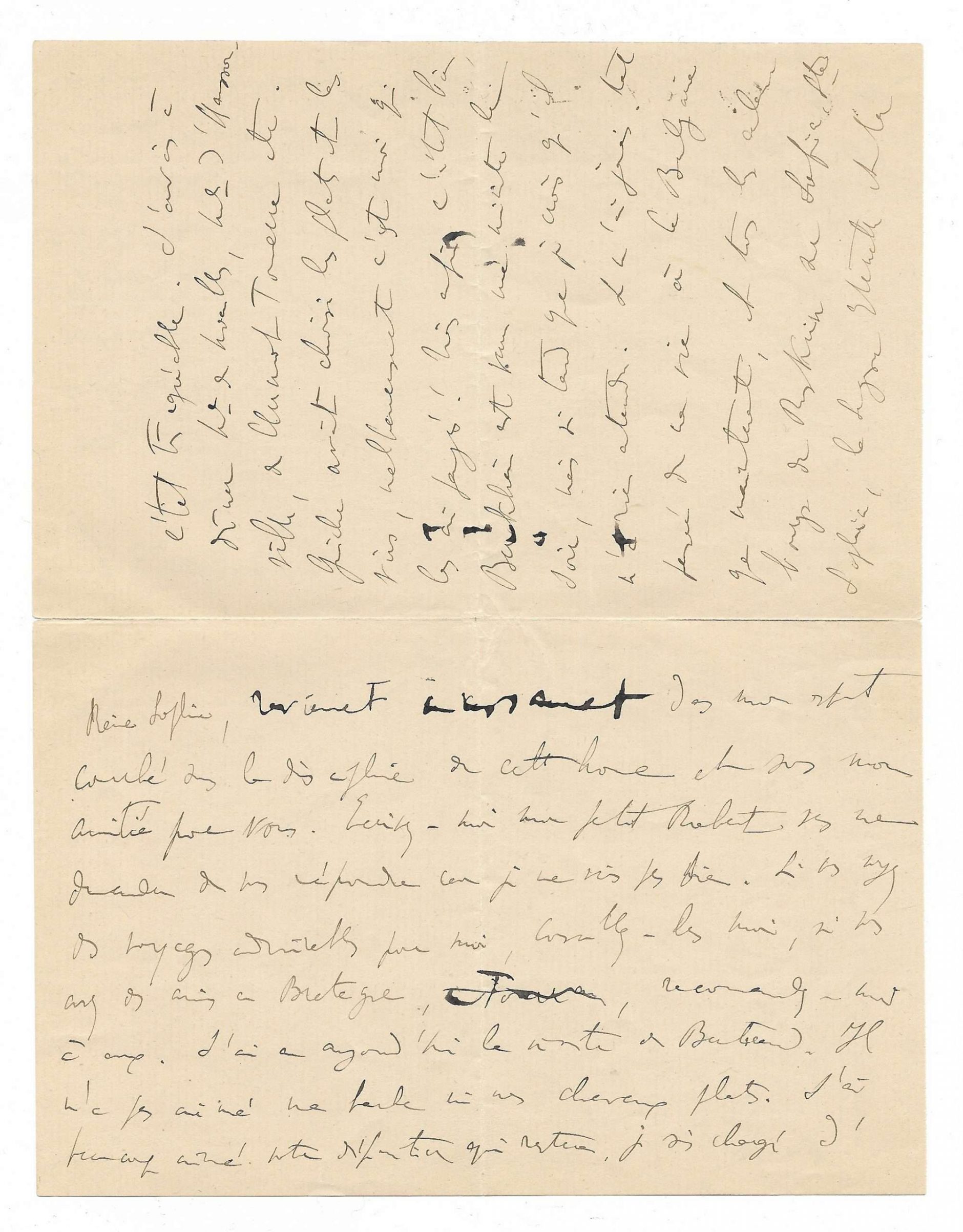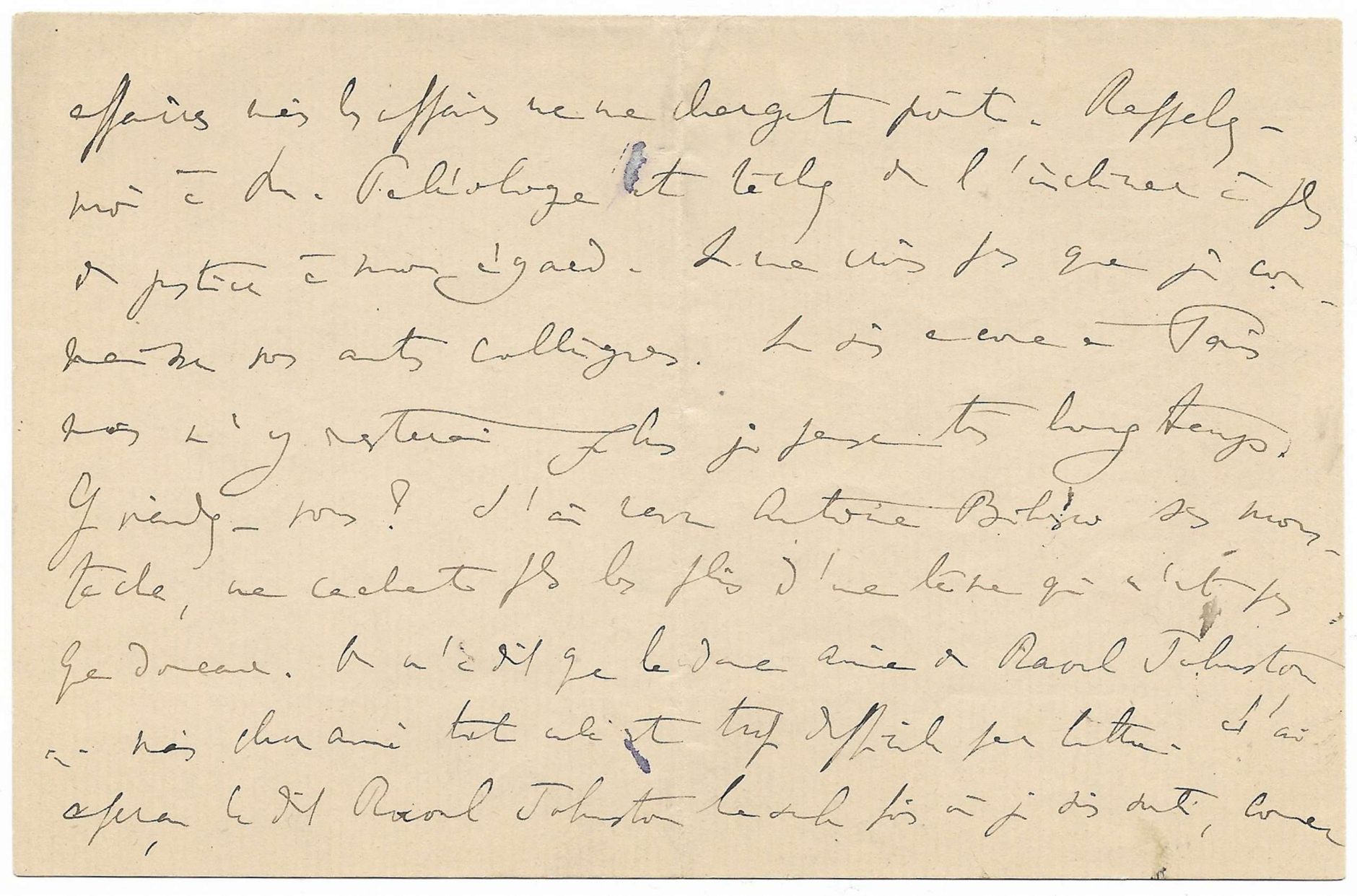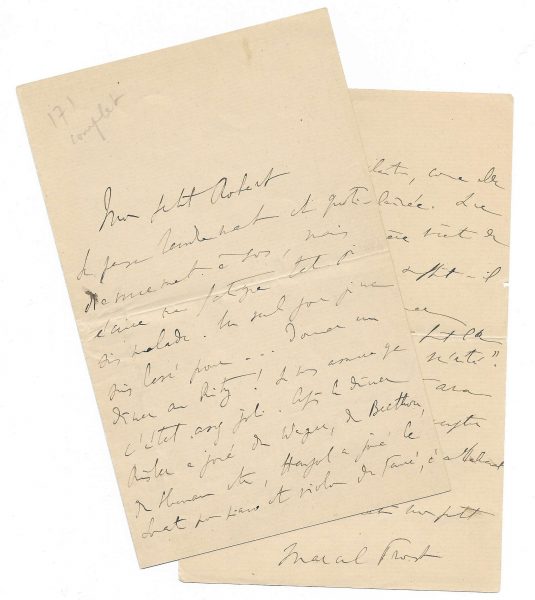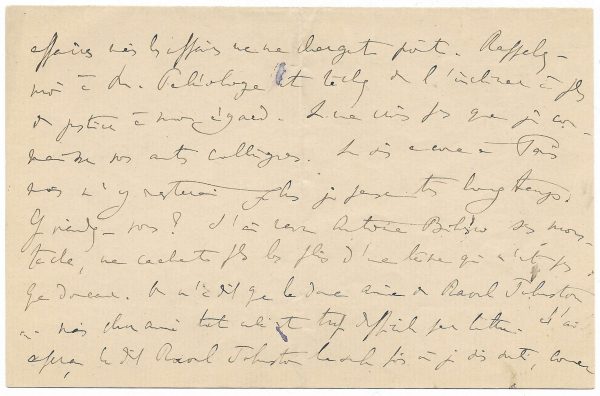PROUST, Marcel (1871-1922)
Autograph letter signed « Marcel Proust » to Robert de Billy
[Paris, second half of July, 1907] 5 pages in-8°
“But isn’t it enough that you are the appearance to rejoice a heart that flees from the truth?”
Fact sheet
PROUST, Marcel (1871-1922)
Autograph letter signed « Marcel Proust » to Robert de Billy
[Paris, second half of July, 1907] 5 pages in-8
Fold mark, some small stains and ink stains on page 3. Extremely tiny missing piece of paper on one page without affecting the text.
Rich and exceptional letter from Marcel Proust evoking his dinner at the Ritz, Ruskin, his physique… and quoting Baudelaire to formulate his attraction for a man.
“Mon petit Robert
Je pense tendrement et quotidiennement à vous, mais écrire me fatigue tant je suis malade. Un seul jour je me suis levé pour… donner un dîner au Ritz ! (1) Je vous assure que c’était assez joli. Après le dîner Risler (2) a joué du Wagner, du Beethoven, du Schumann etc., Hayot a joué la Sonate pour piano et violon de Fauré, c’était très agréable. J’avais à dîner Me de Noailles, Mes d’Aussonville, de Clermont Tonnerre etc. Guiche avait choisi les plats et les vins, malheureusement c’est moi qui les ai payés ! (3) Mais enfin c’était bien, Berkheim est venu une minute le soir, mais si tard que je crois qu’il n’a rien entendu.
Je n’ai jamais tant pensé de ma vie à la Bulgarie(4) que maintenant et tous les calembours de Ruskin(5) sur Sofia, Sainte-Sophie, la sagesse éternelle et la reine Sophie, reviennent incessamment dans mon esprit courbé sous la discipline de cet homme et sous mon amitié pour vous. Ecrivez-moi mon petit Robert sans me demander de vous répondre car je ne suis pas bien. Si vous voyez des voyages admirables pour moi, conseillez-les moi, si vous avez des amis en Bretagne, recommandez-moi à eux. J’ai eu aujourd’hui la visite de Bertrand [de Fénelon]. Il n’a pas aimé ma barbe ni mes cheveux plats. J’ai beaucoup aimé votre définition qui restera, je suis chargé d’affaires mais les affaires ne me chargent point. Rappelez-moi à M. Paléologue et tâchez de l’incliner à plus de justice à mon égard. Je ne crois pas que je connaisse vos autres collègues. Je suis encore à Paris mais n’y resterai plus je pense longtemps. Y viendrez-vous? J’ai revu Antoine de Bibesco sans moustache, ne cachant plus les plis d’une lèvre qui n’est pas que douceur. On m’a dit que la dame amie de Raoul Johnston a – mais cher ami tout cela est trop difficile par lettre. J’ai aperçu le dit Raoul Johnston(6) la seule fois où je suis sorti(7), comme sa physionomie me plait, comme elle est originale et éclairée. Je ne sais pas si cette lumière vient de l’esprit:
« Mais ne suffit-il pas que tu sois l’apparence
Pour réjouir un cœur qui fuit la vérité »(8)
Si madame de Billy est avec vous voulez-vous lui faire accepter ma grande admiration, mon attachement très respectueux et très vif. Je vous aime tendrement mon petit Robert.
Marcel Proust”
1. It had all started two weeks earlier when Proust had been received (at midnight, Proustian timetable) by Gaston Calmette, the all-powerful director of Le Figaro, whom the wife of a minister would assassinate seven years later. It was then that the young Marcel, whose “long articles, not very appealing to the public’s taste” according to him, appeared in the daily newspaper of Le Tout-Paris, and proposed to his employer to organize a dinner, in a way in his honour.
2. Fauré was to attend the evening and play several sequels with Marguerite Hasselmans, then other plays with Maurice Hayot, but he had an indisposition. Pianist Edouard Risler replaced him.
3. Anna de Noailles was portrayed as Viscountess Gaspard of New Year’s Eve in Jean Santeuil. Ms. d’Haussonville inspired Proust for the character of the Marquise René-Elodie de Cambremer in “The Search“. Finally, Armand de Guiche will inspire the character of the future Saint Wolf, also in “The Search“.
4. Bulgaria, of which the capital is Sofia, was a vassal of Turkey until 1908, when it became an independent kingdom. Robert de Billy was appointed first-class secretary in Sofia on January 29, 1907. (Kolb)
5. Ruskin quotes a letter that Queen Sophie-Charlotte (mother of the father of Frederick the Great) addresses to the Jesuit Volta, and then replies: “Unfortunately no, Queen Sophie, we must not report for this kind of thing neither to the old Saint Jerome nor to any other lip or espr Human it; but only to the Eternal Sophia, to the Power of God and to the wisdom of God. (The Bible of Amiens, translation by Marcel Proust, Chapter III, 47, p. 235). Proust adds in note: “Essentially Ruskinian allusion to the etymology of the word: Sophie, here it is hardly a pun, but the reader was able to see in the last chapter about the delicately “Saline” meaning of the word Salien and in the puns with ” Salted” and “Salients” to which Ruskin’s etymological mania could go. (Kolb). Finally, it was Robert de Billy, a diplomat who was stationed in London from 1896 to 1899, who introduced Ruskin to Proust.
6. Raoul Johnston, son of Nathaniel Johnston, MP for Bordeaux, and his first wife. He was a civil engineer and a member of the Jockey Club. All-P. 1908, 301; Q E-V, 265 (Kolb).
7. An allusion, it seems, to the evening when Proust had an appointment with Francis de Croisset at the Larue restaurant, where he waited in vain for him on July 8 or 9, 1907. (Kolb)
8. Baudelaire, l’Amour du mensonge – Les Fleurs du Mal, Tableaux parisiens, XCVIII.
Marcel Proust remained deeply affected by the death of his mother, Jeanne Weil Proust, on September 26, 1905.
He will therefore remain relatively reclusive, residing between Paris and Versailles. This famous dinner at the Ritz on July 1, 1907 was, in addition to organizing it in honor of Calmette, an excuse for Proust to rediscover the taste of Parisian evenings. 1907 was also the year when the writer was still at the genesis of the writing of his timeless masterpiece, In Search of Lost Time. Everyone knows that he was inspired by a multitude of people gravitating around the socialite that he frequented at the time, many of whom are mentioned in this letter.
Note: Kolb VIII, p. 230
